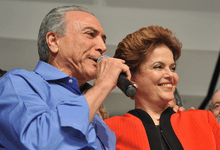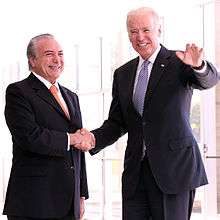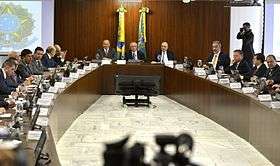Michel Temer
| His Excellency Michel Temer | |
|---|---|
.jpg) | |
| 37th President of Brazil | |
|
Assumed office 31 August 2016[lower-alpha 1] | |
| Vice President | None |
| Preceded by | Dilma Rousseff |
| 24th Vice President of Brazil | |
|
In office 1 January 2011 – 31 August 2016 | |
| President | Dilma Rousseff |
| Preceded by | José Alencar |
| Succeeded by | Position vacant |
| President of the Chamber of Deputies | |
|
In office 2 February 2009 – 17 December 2010 | |
| Preceded by | Arlindo Chinaglia |
| Succeeded by | Marco Maia |
|
In office 2 February 1997 – 14 February 2001 | |
| Preceded by | Luís Eduardo Magalhaes |
| Succeeded by | Aécio Neves |
| President of the Brazilian Democratic Movement Party | |
|
In office 9 September 2001 – 5 April 2016 | |
| Preceded by | Jader Barbalho |
| Succeeded by | Romero Jucá |
| Personal details | |
| Born |
Michel Miguel Elias Temer Lulia 23 September 1940 Tietê, São Paulo, Brazil |
| Political party | Brazilian Democratic Movement |
| Spouse(s) |
|
| Domestic partner | Neusa Popinigis (separated) |
| Children | 6 |
| Residence | Alvorada Palace |
| Alma mater |
University of São Paulo Pontifical Catholic University of São Paulo |
| Religion | Roman Catholicism |
| Signature |
|
Michel Miguel Elias Temer Lulia (Portuguese pronunciation: [miˈʃɛw miˈɡɛw eˈliɐs ˈtẽmeɾ luˈliɐ]; born 23 September 1940) is a Brazilian lawyer and politician who is the 37th and current President of Brazil. He took office on 31 August 2016, after the impeachment and removal of his predecessor Dilma Rousseff, having served as Vice President since 2011 and as Acting President since 12 May 2016, when Rousseff was suspended from her presidential powers and duties to face her impeachment trial.[1] At 75 years and 11 months old, he is the oldest person to assume the office.
On 31 August 2016 the Senate voted 61–20 to impeach President Dilma Rousseff and remove her from office. Temer succeeded to the presidency, to serve out what would have been the remainder Rousseff's second term until 1 January 2019. In his first speech in office, Temer called for a government of "national salvation" and asked for the trust of the Brazilian people.[2] He has also signaled his intention to overhaul the pension system and labor laws, and curb public spending.[3]
Early life and education
Born in Tietê, São Paulo, Temer is the son of Nakhoul "Miguel" Elias Temer Lulia and March Barbar Lulia, Maronite Lebanese immigrants who migrated to Brazil in 1925.[4][5] His parents, along with three older siblings, immigrated to Brazil from Btaaboura, in Northern Lebanon, to escape famine and instability due to World War I. In Brazil, his parents had five more children, and Temer is the youngest. Temer does not speak fluent Arabic, but is able to understand the subject of a conversation in that language.[6][7][8]
Raised Maronite, an Eastern Catholic sui iuris particular church of the Roman Catholic Church, Temer confirms his affiliation as a Roman Catholic.[9]
Temer holds a Bachelor of Laws degree from the Law Faculty of the University of São Paulo and a doctorate from the Pontifical Catholic University of São Paulo. He served as State prosecutor and twice as State Secretary for Public Security, in both capacities working in São Paulo. He is a licensed professor of Constitutional Law at PUC-SP, and has authored numerous books on the subject.
Career
Beginning in 1987 Temer served six consecutive terms in the Chamber of Deputies,[10] and on three separate occasions served two-year terms as President of the Chamber (in 1997–1998, 1999–2000 and 2009–2010).[4] Temer was also a member of the 1988 National Constituent Assembly, which promulgated the current Constitution of Brazil.[4] Politically he rose to become chairman of the Brazilian Democratic Movement Party (PMDB), the largest party in Brazil.[10]



He is the second Vice President of Lebanese origin, after José Maria Alkmin. His family originates from the town of Btaaboura in Koura District, neighboring the city of Tripoli in Northern Lebanon.[11][12]
Investigations
According to official government documents published by Wikileaks, Temer provided information to the U.S. Embassy in Brazil since 2006.[13] Temer is described as gaining the loyalty of lower class Brazilians by strengthening social programs and being opposed to Lula da Silva.[14] The report has the status "sensitive but unclassified" with Temer stating that Lula da Silva "might finally begin to heed his friends on the left" and would "be led away from the orthodox macro-economic policies that have dominated his first term".[14]
Impeachment process
Temer's impeachment process[15] began with the decision on April 6, 2016, by the President of the Chamber of Deputies, Eduardo Cunha, to form commission for termination analysis of liability for crime offered by attorney Mariel M. Marra. Four other requests for impeachment were presented to Cunha.[16] On May 17, 2016, the Minister Marcos Aurélio allowed the impeachment request to enter the agenda of the Supreme Federal Court plenary session.[17]
Role in the impeachment process against Dilma Rousseff
In 2015 and 2016, Temer was involved in controversy as Dilma Rousseff's impeachment process unfolded. In December 2015, Temer sent a letter to the president complaining about his distance from government decisions. The letter began with the Latin proverb "Verba Volant, Scripta Manent" (spoken words fly, written words remain). Temer then describes the communication as “personal,” and a means of unburdening himself about various complaints against the president. He said Rousseff has made him look like a “decorative” vice president rather than an active one, despite having been invited to support her government several times in the dialogue with Congress, a role he only accepted in 2015.
The letter has been commented and mocked on Brazilian social media, with images depicting the vice president as a Christmas decoration, making fun of his use of Latin, and photos purporting to show the president laughing while she reads the missive, among many other things. The president's office had no immediate comment on the images,[18] but Rousseff had condemned him as a traitor to her administration.[19]
Later, in April 2016, an audio file of Temer was leaked to the media. In the file, Temer speaks as if the impeachment process had already been confirmed and he was the new president.[20] “I don’t want to generate false expectations,” Temer said on the recordings, which were first published by Folha de S. Paulo on May 23. “Let’s not think that a possible change in government will solve everything in three or four months.”
The leak came just hours before a special lower house committee was scheduled to vote whether to back the request to impeach the president, generating complaints and accusations of treachery and lack of support from a vice president conspiring against the elected president. Temer alleged it was sent incorrectly to a WhatsApp group of his party's representatives in Congress.
Acting President

In the early hours of 12 May 2016, the Federal Senate voted to accept President Dilma Rousseff's impeachment indictment and, therefore, Vice President Temer assumed the presidential powers and duties as Acting President. In accordance with the rules set by the Brazilian Constitution, Temer will be Acting President for 180 days at the most. During this period, the Senate must decide whether to convict President Rousseff and remove her from office (in which case, Temer would become President for the remainder of the term) or to acquit her of the crimes of responsibility charges (Rousseff would have her presidential powers and duties restored to her). Temer is awaiting a decision from the Supreme Federal Court to start an impeachment process against him.
On his first day as acting president, Temer appointed a new cabinet, reducing the number of ministries from 31 to 22. Women's rights and Afro-Brazilian rights activists criticized the fact of all of the appointed ministers were white men, for the first time since 1979.[21][22]
On 2 June 2016, was declared ineligible for the 2018 election.[23]
President
.jpg)
After the impeachment of Dilma Rousseff, on 31 August 2016 Michel Temer succeeded as President of Brazil. His term finishes on 1 January 2019.[24] In October 2016, the Constitution of Brazil may be amended by deputies[25] and the public spending may be effectively frozen for twenty years, being only adjusted for inflation. This matter is being subject of both praise and criticism among the Brazilian middle-class.[26]
In November 2016, Marcelo Calero, Temer's former Minister of Culture, resigned and alleged that Temer had pressured him to help an ally, Geddel Vieira Lima, the government secretary, who had invested in an development that was being delayed by a heritage preservation measure by allowing construction to go ahead in spite of said measure. Vieira Lima resigned on November 25, 2016, and opposition leaders stated that they would seek Temer's impeachment over this incident.[27] Temer denied the corruption allegations but admitted talking to Calero about the project.[28]
Award and decorations
| Award or decoration | Country | Note | |
|---|---|---|---|
| |
Grand Cross of Dannebrog | Contribution to the arts, sciences or business life or for those working for Danish interests | |
| |
Knighthood of the Order of Prince Henry (Grand Officer) | Exceptional and outstanding merit for Portugal and its culture | |
| |
Legion of Honor | French highest order of merit. | |
References
- ↑ Acting President: 12 May 2016 – 31 August 2016, while awaiting Dilma Rousseff's final impeachment verdict by the Federal Senate.
- ↑ Watts, Jonathan (2016-05-12). "Dilma Rousseff suspended as senate votes to impeach Brazilian president". The Guardian. ISSN 0261-3077. Retrieved 2016-09-03.
- ↑ "Brazil impeachment: New leader Temer calls for trust". BBC. 13 May 2016. Retrieved 13 May 2016.
- ↑ Magalhaes, Luciana; Jelmayer, Rogerio (2016-08-31). "Michel Temer Seeks New Start as Brazil's President". Wall Street Journal. ISSN 0099-9660. Retrieved 2016-09-03.
- 1 2 3 "Presidência da República Federativa do Brasil: Vice-Presidente: Biografia" (in Portuguese).
- ↑ O Cardeal Temer
- ↑ Isaura Daniel (25 March 2013). "Os planos de Michel Temer para o mundo árabe". Agência de Notícias Brasil-Árabe. Retrieved 26 April 2016.
- ↑ "Conciliador, 'charmosão' e 'mordomo de filme de consternação': afinal, quem é Michel Temer". Entretenimento bit. 30 March 2016. Retrieved 26 April 2016.
- ↑ Diogo Bercito (14 June 2015). "Origem de políticos brasileiros, Líbano tem rua com nome de Michel Temer". Folha de S. Paulo. Retrieved 2 May 2016.
- ↑ Vilarejo libanês do 'filho Michel Temer' segue igreja ortodoxa grega
- 1 2 Cantanhéde, Eliane (1 November 2010). "Líder do PMDB, Temer terá mais força que vices de FHC e de Lula" [As leader of the PMDB, Temer has more power than the vice presidents of Fernando Henrique Cardoso and Lula]. Folha de S.Paulo (in Portuguese). São Paulo, Brazil. Archived from the original on 11 May 2016.
- ↑ Dyke, Joe (2 July 2014). "The most powerful Lebanese person alive". Executive Magazine. Archived from the original on 11 May 2016.
- ↑ Bercito, Diogo (4 May 2015). "Politicians of Lebanese descent flourish in Brazil". The Daily Star. Lebanon. Archived from the original on 5 May 2015. (subscription required (help)).
- ↑ Brazil's acting president used to be US intel informant – WikiLeaks. rt.com (13 May 2016)
- 1 2 https://wikileaks.org/plusd/cables/06SAOPAULO689_a.html
- ↑ Renan Ramalho (5 April 2016). "STF manda Cunha dar andamento a pedido de impeachment de Temer" (in Portuguese). G1. Retrieved 5 April 2016.
- ↑ Fernanda Calgaro (5 April 2016). "Cunha rejeita pedido de impeachment de Temer feito por Cid Gomes" (in Portuguese). G1. Retrieved 5 April 2016.
- ↑ "Pedido de impeachment de Temer é liberado para entrar na pauta do STF" (in Portuguese). Estado de Minas. 17 May 2016. Retrieved 18 May 2016.
- ↑ Trevisani, Paulo; Jelmayer, Rogerio (8 December 2015). "Brazil Vice President Sends Letter Criticizing President Dilma Rousseff". Wall Street Journal. Retrieved 17 April 2016. (subscription required (help)).
- ↑ Romero, Simon (21 April 2016). "Brazil's Vice President, Unpopular and Under Scrutiny, Prepares to Lead". The New York Times. Archived from the original on 11 May 2016.
- ↑ Edgerton, Anna; Colitt, Raymond (11 April 2016). "Leaked Brazil Tape Shows VP Temer Practicing Unity Address". Bloomberg. Archived from the original on 11 May 2016.
- ↑ Sims, Shannon (May 12, 2016). "Brazil's New President Michel Temer Fills Cabinet With Only Men". Forbes. Retrieved September 4, 2016.
- ↑ Koren, Marina (May 25, 2016). "Who's Missing From Brazil's Cabinet?". The Atlantic. Retrieved September 4, 2016.
- ↑ Greenwald, Glenn (3 June 2016). "Credibility of Brazil's Interim President Collapses as He Receives 8-Year Ban on Running for Office". The Intercept. Retrieved 10 September 2016.
- ↑ http://www.reuters.com/article/us-brazil-impeachment-idUSKCN114071
- ↑ http://www.rfi.fr/ameriques/20161011-bresil-depenses-publiques-temer-20-ans
- ↑ http://www.redebrasilatual.com.br/politica/2016/08/tecnicos-e-parlamentares-criticam-pec-241-e-dizem-que-impacto-das-medidas-sera-nocivo-para-o-pais-4925.html
- ↑ Romero, Simon (2016-11-25). "Brazil's President, Michel Temer, Embroiled in New Corruption Scandal". The New York Times. ISSN 0362-4331. Retrieved 2016-11-25.
- ↑ "Brazil president Michel Temer accused of corruption". BBC News. November 25, 2016. Retrieved November 25, 2016.
External links
| Wikimedia Commons has media related to Michel Temer. |
| Political offices | ||
|---|---|---|
| Preceded by Luís Eduardo Magalhaes |
President of the Chamber of Deputies 1997–2001 |
Succeeded by Aécio Neves |
| Preceded by Arlindo Chinaglia |
President of the Chamber of Deputies 2009–2010 |
Succeeded by Marco Maia |
| Preceded by José Alencar |
Vice President of Brazil 2011–2016 Acting President 2016 |
Vacant |
| Preceded by Dilma Rousseff |
President of Brazil 2016–present |
Incumbent |
| Party political offices | ||
| Preceded by Jader Barbalho |
President of the Brazilian Democratic Movement Party 2001–2016 |
Succeeded by Romero Jucá |
